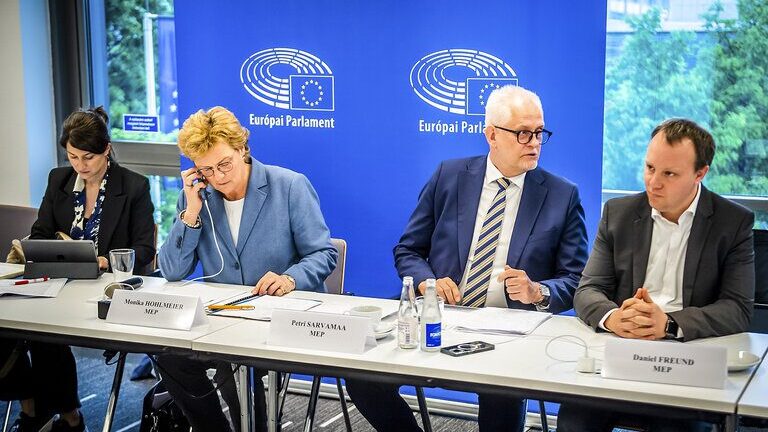
Members of the CONT delegation (from left to right): MEPs Lara Wolters, Monika Hohlmeier, Petri Sarvamaa, and Daniel Freund.
Photo: Isza FERENC © European Union 2023 – Source : EP
MEPs of the European Parliament’s budgetary committee (CONT) concluded their official, three-day ‘fact-finding’ mission to Hungary on Wednesday, May 17th, overseeing the implementation of reforms needed to unlock the billions of frozen funds the Commission currently withholds from Budapest.
“EU funds represent a very big opportunity for the development of Hungary [and] the prosperity of Hungarian citizens,” the German MEP Monika Hohlmeier (EPP), heading the delegation said at Wednesday’s press conference.
“However, our core concern is,” she added, “how to ensure that all regions, citizens, and businesses have equal access to EU funds without any discrimination and without any political bias?”
MEP Hohlmeier underlined that the CONT committee is the sole authority responsible for the democratic scrutiny of the disbursement of EU funds, and therefore also responsible for the ‘conditionality mechanism’ under which the EU imposed financial punishment on Hungary over certain rule of law concerns.
“In our responsibility as discharge authority, we also assess the ongoing process of the implementation of the 27 ‘super milestones’ for Hungary to unblock payments under the Recovery and Resilience Facility,” the MEP explained, referencing the EU’s €700 billion pandemic recovery plan, of which Hungary still has not received a single cent.
The delegation also included MEPs Petri Sarvamaa (EPP, Finland), Lara Wolters (S&D, the Netherlands), and Daniel Freund (Greens, Germany). After three days of talking to various stakeholders, businesses, NGOs, political groups, and relevant ministries, the delegation was ready to share its findings.
“We noticed several positive developments,” Hohlmeier said, such as the establishment of the new Integrity Authority, adding that “we recognize reforms increasing cooperation” between national and EU financial bodies, as well as the strengthening of the National Judiciary Council.
Naturally, certain shortcomings were also noted, with further mechanisms needed to ensure the effectiveness of auditors to oversee the “planning, implementation, [and] control” of the disbursement of funds as well as fair-competition issues related to public procurement processes. Many of the questions they had about the use of EU funds “remained unanswered,” Hohlmeier said.
However, as Tibor Navracsics, the Hungarian minister for regional development noted after meeting the delegation on the same day, the MEPs were not entirely impartial either. While the discussion at the mission’s highest-level meeting was “objective, and seeking mutual understanding,” Navracsics said,
it was noticeable that the delegation had not read the background material that had been sent to them beforehand in order to obtain more in-depth information, while political prejudices had also influenced the opinions of some MEPs, and consequently, factual errors were sometimes made during the questions.
Regardless, the minister was confident that the Hungarian side would be able to convince the delegation on some of the most crucial issues, and that the CONT committee would become a long-term partner in Budapest’s bid to unblock the funds.
“Our goal is not to stop the money,” Hohlmeier concluded his remarks. “Our goal is that the money is spent in Hungary. We hope that we can contribute to it.”
